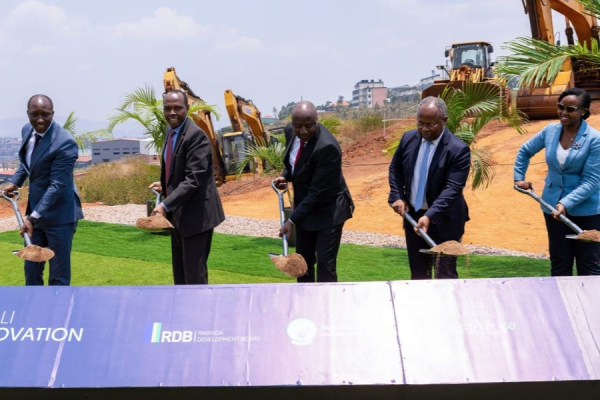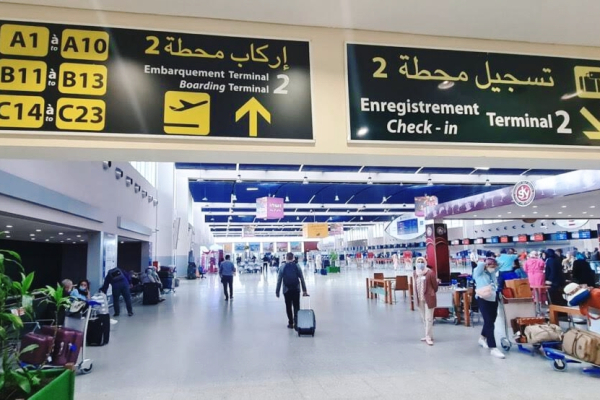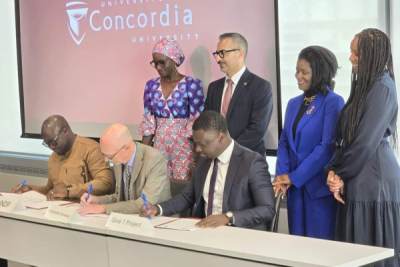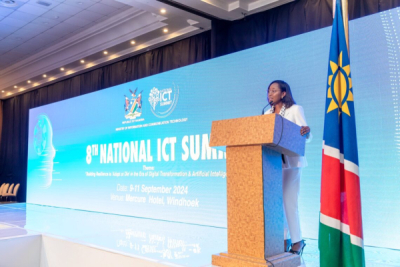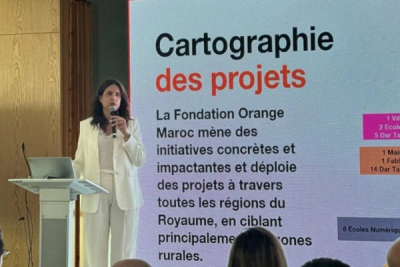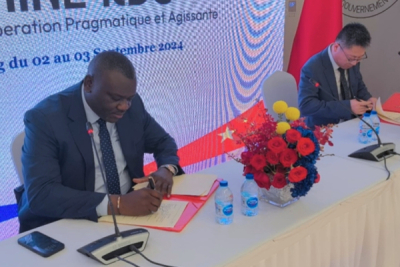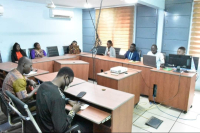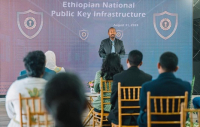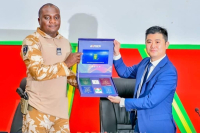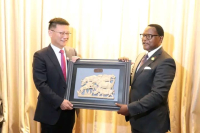
Tech (804)
Establishing innovation hubs and fostering tech education drives entrepreneurship by empowering individuals to create localized solutions to pressing challenges. This approach enables African nations to develop indigenous technologies in sectors such as agriculture, healthcare, and education, decreasing their dependence on foreign innovations.
The Rwandan government, led by Prime Minister Dr. Edouard Ngirente, has inaugurated the construction phase of the Kigali Innovation City (KIC), a major initiative aimed at advancing technological innovation in Rwanda. The groundbreaking ceremony took place on September 10 in Kigali’s Special Economic Zone, Gasabo District.
"Kigali Innovation City is more than just infrastructure; it is an ecosystem designed to promote innovation, attract top talent, and drive investment," Dr. Ngirente emphasized. He added that KIC aligns with Rwanda's vision of a prosperous, tech-driven future for the nation and the African continent.
Rwanda’s ICT and Innovation Minister, Paula Ingabire Musoni, underscored the importance of KIC as a catalyst for tech investment. She described KIC as a platform where multinational companies and startups can collaborate on solutions that will shape Rwanda's future technology agenda.
The KIC project, a 61-hectare smart city worth over $ 2 billion, is a master-planned city designed to create a hub for technological innovation. It will include universities, startup incubators, office spaces, and supporting facilities such as retail and hospitality services. Pioneering Infrastructure investor and asset manager Africas50, backed by African global capital, was granted exclusive rights by the Rwandan Government to develop, operate, and commercialize the city.
The project is expected to generate $150 million in annual ICT exports and attract over $300 million in foreign direct investment. The city is also projected to create more than 50,000 jobs upon completion and produce over 2,600 tech graduates annually, bolstering Rwanda's tech ecosystem.
This initiative aligns with government-led programs like the Smart Rwanda Master Plan, which aims to transform the nation into a knowledge-driven economy, and the One Laptop Per Child initiative designed to empower the population with digital literacy. By increasing digital proficiency, Rwanda can enhance the workforce available to innovation hubs like Kigali Innovation City (KIC), encouraging entrepreneurship and the creation of technology solutions that address African challenges. In the long run, this will cultivate a thriving innovation ecosystem, strengthen Rwanda's position as a continental tech leader, and contribute to bridging the digital divide, fostering sustainable growth, and advancing Africa’s global technological presence.
The ICT sector in Rwanda has grown steadily over the years. According to the Rwanda Development Bank’s ICT Skills Snapshot 2022, the sector contributed 2% of GDP and employed around 8,962 workers (0.26% of employment) as of 2020. The government targets a higher contribution through its Digital Transformation Strategy and projects like KIC.
Hikmatu Bilali
To boost its economic growth and enhance its international visibility, Morocco is betting on the development of tourism. In this context, the country is investing in the modernization of its airports, which serve as key gateways to its territory.
The National Airports Authority (ONDA) has launched a strategy called "Décollage 2025," with a key focus on digital transformation, to create a seamless digital experience for travelers by 2025. This initiative was announced by Mohammed Abdeljalil, the Minister of Transport and Logistics.
"The Office has allocated substantial funds for the digital transformation, hiring specialized technical experts to manage its Digital Factory unit. This unit will oversee the implementation of projects aimed at bolstering the digital transformation of the Office across all its activities," explained the minister.
One of the first steps in this plan is the installation of "e-gate" smart portals at Moroccan airports. These automated systems use biometric technology to verify travelers' identities. The self-service devices allow passengers to pass through immigration without an agent, speeding up both boarding and disembarking processes.
The new terminal at Rabat-Salé Airport, set to open in 2025, will serve as a pilot project before the initiative is extended to other major airports, such as Mohammed V and Marrakech-Menara. The strategy also includes implementing a "SMART AIRPORT" information system that will provide real-time monitoring of airport facilities and collect data to enable quick responses in case of operational issues.
These initiatives aim to modernize Morocco’s airport infrastructure ahead of major events like the Africa Cup of Nations next year and the 2030 FIFA World Cup, which Morocco will co-host with Spain and Portugal. The improvements will enhance the travel experience and streamline data coordination.
By integrating e-gates, Morocco is following in the footsteps of many European countries that have successfully adopted this technology. This system marks a significant step toward the digitization of airport services, providing travelers with a more efficient experience while boosting security.
Samira Njoya
In 2023, the United Nations Development Programme (UNDP) initiated a pilot project to train young people from 24 African countries in cybersecurity. The success of this initial phase has led to the launch of a larger initiative aimed at expanding the program.
The West and Central Africa Regional Bureau of the United Nations Development Programme (UNDP) announced Monday, its commitment to training 25,000 young people in cybersecurity across both subregions. To achieve this goal, the UNDP has partnered with Canada's Concordia University and the digital skills academy Give1Project. The training will last five months and will culminate in a certification.
The initiative follows the success of a 2023 pilot phase, which provided a four-month cybersecurity training program for youths from 24 African countries, including two weeks of in-person sessions in Saly, Senegal. According to the International Telecommunication Union (ITU), Africa faces a shortage of 100,000 qualified cybersecurity professionals.
In recent years, cybersecurity has become one of the most critical sectors in Africa’s tech landscape. With the continent's digital market expected to reach $712 billion by 2050, the ITU estimates that Africa’s lack of cybersecurity readiness costs its member states an average of 10% of their GDP. Beyond investing in local talent, African countries must also establish robust legal and regulatory frameworks to address cybersecurity challenges.
Adoni Conrad Quenum
The Namibian government has made digital transformation a cornerstone of its socioeconomic development. To ensure the security of individuals and systems, the administration plans to implement robust safeguards.
amibia is on the verge of implementing regulatory frameworks for cybersecurity and data protection. Minister of Information and Communication Technology (ICT) Emma Theofelus announced on Monday, September 9, that two draft laws are nearing completion.
Speaking at the launch of the eighth National ICT Summit, Theofelus stressed the importance of these laws in a rapidly evolving digital landscape. "To thrive in this new era, we must not only adapt to technological changes but also build a resilient framework capable of keeping pace with advancements," she stated.
The cybersecurity and data protection laws are part of the National Digital Strategic Plan for 2025-2029. Their development comes amid a fast-paced digital transformation, marked by the rapid adoption and diversification of ICT usage. For instance, mobile internet subscriptions in Namibia rose from 934,000 in Q2 2016 to 1.532 million in Q2 2024, a 64.1% increase. By the end of June, the number of mobile subscribers had reached 2.47 million.
This rapid growth in digital adoption brings new challenges, particularly the rising threat of cybercrime. According to Interpol’s "African Cyberthreat Assessment Report 2024," cybercriminals are using increasingly sophisticated methods to exploit vulnerabilities in individuals, organizations, and states.
Strengthening cybersecurity and personal data protection is essential to achieving the Namibian government’s digitalization ambitions. The government aims to leverage digital technologies to drive economic growth, promote social inclusion, and foster overall societal progress.
“From e-government to digital health and education, these technologies offer new ways to enhance service delivery and improve the quality of life for our population. We must harness these technologies to make government services more accessible, efficient, and responsive to citizens' needs,” added Emma Theofelus.
Isaac K. Kassouwi
Morocco is facing a persistent problem of school dropouts, particularly in rural areas. Efforts are underway to reverse this growing trend.
Orange Maroc Foundation announced on Thursday plans to equip 55 new schools with computer equipment for the 2024-2025 school year as part of its "Digital Schools" program. The announcement came during the launch of the project's second phase.
“This program aims to democratize access to digital technologies in rural primary schools, ensuring equal learning conditions for all students, regardless of their environment. Strengthening our partnership with the Ministry of National Education is further proof of our commitment to supporting the Kingdom in the successful digital transformation of Moroccan schools,” said Hind Lfal (photo), Secretary General of Orange Maroc.
Launched in 2022 in partnership with the Ministry of National Education, the project provides digital equipment, including computers for teachers, tablets for students, and online educational resources. It aims to enhance learning in rural areas, which often face challenges in accessing modern educational tools.
This initiative aligns with Orange Maroc's corporate social responsibility strategy to promote digital inclusion and combat school dropouts. According to the Moroccan Ministry of National Education, 249,458 students dropped out of school in 2022/2023, with 45.5% coming from rural areas. UNESCO estimates the economic impact of this issue in Morocco at $196 million annually.
With this new phase, 55 additional schools will be equipped, 200 teachers will receive training, and 17,000 students will benefit from the initiative. Since its launch, the program has already digitized 16 rural schools, benefiting over 4,000 students and 30 teachers.
Samira Njoya
Social media is a daily staple, but it also poses complex ethical dilemmas. Balancing free speech with the fight against misinformation, hate speech, and harassment is a critical challenge.
The Democratic Republic of Congo (DRC) has begun talks with a Chinese company to implement a social media surveillance system. The agreement was signed on Wednesday by Augustin Kibassa Maliba, the DRC’s Minister of Posts, Telecommunications, and Digital Economy during the China-Africa Cooperation Forum.
While details are limited on the specifics of that agreement, the government likely aims to regulate online content in response to disinformation, hate speech, and other harmful activities. The DRC's current sociopolitical climate, including armed conflict and tensions with Rwanda, has created fertile ground for misinformation.
According to an analysis by the Collaboration on International ICT Policy for East and Southern Africa (CIPESA), this “information war” is having severe impacts on national cohersion.
According to DataReportal, the DRC had 6.45 million active social media users as of January 2024, a growth of 37.2% from the previous year. Of these users, 37.2% were women and 62.8% were men. Facebook was the dominant platform, followed by TikTok (4.44 million users), Facebook Messenger (1.15 million), Instagram (670,000), LinkedIn (620,000), and X (formerly Twitter, 253,000). This growing user base has raised the stakes for managing the flow of information online in the DRC.
Digital transformation is rapidly reshaping Africa, affecting industries across the board. As the continent adopts innovative technologies to fuel its progress, preserving data has become a pressing concern.
Burkina Faso is gearing up to launch BurkinOS, a custom-built open-source operating system designed to meet the specific needs of its national public administration. In preparation for its rollout, the Ministry of Digital Transition, Posts, and Electronic Communications held a training session on Wednesday, September 4, for secretaries and office staff from various government departments.
"The participants received technical training on using and installing BurkinOS and the LibreOffice suite on their workstations. By opting for free and open-source solutions, Burkina Faso is strengthening its technological autonomy with more reliable, secure, and contemporary solutions," the General Directorate of Digital Transformation explained in a statement.
This initiative is part of a broader effort to modernize public administration in Burkina Faso and increase the adoption of electronic services. The goal is to enhance administrative efficiency and responsiveness.
The BurkinOS system, which is expected to be deployed shortly, will offer several key benefits to public administration. In addition to providing complete control over administrative computers and ensuring data security, it will enable centralized management of updates and configurations, streamlining IT system administration. BurkinOS will also promote better interoperability with other national systems, improving the efficiency of information exchange and administrative processes.
Samira Njoya
African countries are increasingly modernizing their digital systems, adopting various technologies to enhance efficiency and transparency. However, the critical issue of digital security is often overlooked.
Ethiopia recently launched a Public Key Infrastructure (PKI) system to enhance the security of online transactions. The initiative, inaugurated by Prime Minister Abiy Ahmed (photo) on Saturday, August 31, aims to bolster the country's digital transformation efforts.
"Securing virtual data complements the task of protecting national sovereignty. Today, we officially launched Public Key Infrastructure (PKI) with the Information Network Security Administration. This will facilitate reliable and secure digital data exchange," Prime Minister Abiy stated on X.
The PKI system is part of Ethiopia's broader cybersecurity strategy. Other initiatives include a training program for five million coders and the national digital identification program.
The PKI will be particularly beneficial for Ethiopian public organizations that provide electronic services, such as issuing driver's licenses, passports, and health insurance. It will also contribute to the growth of e-commerce in the country.
A PKI is a cryptographic solution used to secure electronic information transfer. It issues digital certificates that enable encryption and digital signatures, ensuring confidentiality, authentication, integrity, and non-repudiation during online transactions.
Samira Njoya
The Burkinabe government is firmly committed to modernizing the country through the introduction of new technologies. This initiative is being realized by the adoption of new services aimed at benefiting citizens.
Burkina Faso has officially launched a new electronic passport issuance system, marking a significant milestone in the modernization of its identification infrastructure. The Minister of Security, Mahamadou Sana, inaugurated this "next-generation" tool on Tuesday, September 3, in Ouagadougou.
According to a statement from the Ministry of Security, these new electronic passports—whether ordinary, service, diplomatic, or for refugees—are made of polycarbonate and equipped with an electronic chip that offers enhanced storage capacity. "They reflect the Burkinabe government's commitment to strengthening national identity and providing citizens with documents that meet the highest international standards," the statement noted.
Developed by Chinese company Emptech, the passports are part of the latest generation recommended by the International Civil Aviation Organization (ICAO). They incorporate cutting-edge security features and are available within 24 hours at a cost of XOF50,000 FCFA (approximately €76), provided all required documents are submitted.
The introduction of this new system is part of a broader strategy to modernize identification systems in Burkina Faso. It coincides with the implementation of a law on the Unique Electronic Identifier of Persons, which aims to uniquely identify each individual through biometric and biographical data.
The new system is expected to enhance security, reduce the risks of fraud and identity theft, and enable real-time tracking of the passport production and issuance process. Additionally, it is designed to be interoperable with other national systems, facilitating secure and efficient data exchange, with flexible enrollment options available both online and offline.
Samira Njoya
Enhanced digital access in rural areas fosters economic opportunities by connecting communities to markets, information, and services that were previously out of reach. This can lead to improved agricultural practices through smart farming technologies, better education and healthcare services, and greater access to financial services.
The Government of Malawi has announced plans to launch a "Smart Village Initiative" in partnership with Huawei Technologies. This initiative aims to bring digital transformation to rural areas across the country.
President Lazarus Chakwera revealed the plan on September 3, on the sidelines of the Summit of the Forum on China-Africa Cooperation (FOCAC) being held from September 4-6 in Beijing. He emphasized that the initiative would include establishing technical training centers in rural areas to equip youth with essential digital skills, such as AI, cybersecurity, and smart agriculture solutions, which are vital for supporting large-scale farming initiatives.
The Smart Village Blueprint, conceived as a practical tool to improve Internet access in rural and remote areas, will be the foundation of this project. The Smart Villages project adopts a locally led, integrated approach to providing digital services to all rural citizens. By integrating digital technologies, the initiative aims to deliver equitable, high-quality, and efficient services related to the Sustainable Development Goals (SDGs) for all.
Huawei has been instrumental in transforming rural and urban areas across Africa through its smart village and city initiatives. In July, the company partnered with Zambia to launch a smart village in Namwala, enhancing connectivity and digital access in rural communities. Huawei also recently signed an agreement with Kaduna State, Nigeria, to develop a smart city project, integrating advanced technologies like AI and IoT to improve public safety and transportation.
This initiative aligns with the Malawi 2063 (MW2063) agenda, which envisions transforming Malawi into an industrialized upper-middle-income country by 2063. It builds on a series of successful collaborations between Malawi and Huawei, including the 2022 launch of the country’s first-ever National Data Center, a key milestone in advancing Malawi's digital infrastructure.
Hikmatu Bilali
More...
Africa's cities are facing rapid population growth. Providing millions of people with an adequate living environment requires more targeted investment. The integration of ICTs into urban policies should no longer be overlooked.
Kaduna State Governor Uba Sani and Chris Lu, the CEO of Huawei Technologies Nigeria Limited, have signed a Memorandum of Understanding (MoU) for the Kaduna State Smart City Project. The ceremony which took place at Huawei’s office in Beijing, yesterday September 2, was attended by Nigeria’s President, H.E. Bola Ahmed Tinubu.
Governor Uba Sani explains that“ this project holds the key to a more secure and prosperous Kaduna State.” It will focus on several key areas, including the establishment of a State-Level Unified Command Center, which will centralize and improve security operations. It will also introduce advanced Intelligent Traffic Management systems to optimize transportation within the state. E-Government and Office Automation will streamline administrative processes, while Smart Education and Healthcare initiatives aim to elevate public services.
Additionally, the project will promote ICT Talent Development and integrate Renewable Energy solutions to support sustainable development. Public Transportation will also be enhanced through advanced technology. To ensure the project's success, Kaduna State and Huawei will establish a joint committee to finalize the implementation plan, funding arrangement, and technology deployment.
The UN Department of Economic and Social Affairs (DESA) reports that Nigeria is experiencing rapid urbanization, with more than half of its 213 million population now residing in urban areas. Currently, 53% of Nigerians live in cities, and this figure is expected to exceed 70% by 2050, presenting various challenges. Smart cities could provide effective solutions for managing this urban growth by optimizing resources and services.
Hikmatu Bilali
Artificial intelligence offers Africa a chance to tackle key challenges and drive economic growth. But to fully capitalize on AI, significant investments are needed.
Djibouti plans to become a regional hub for artificial intelligence (AI) innovation, according to Houssein Ahmed Assoweh (photo), the country's representative at the ICESCO regional workshop for the development of the Islamic World Charter on AI.
In an interview with the Djiboutian News Agency ADI, Houssein Ahmed Assoweh said: "We will continue to invest in AI education and training to strengthen national skills. Additionally, we plan to launch several pilot projects in identified priority areas. The goal is to position Djibouti as an AI innovation hub in the Horn of Africa. I am convinced that Djibouti has an important role to play in the global AI ecosystem.”
According to the AI expert, Djibouti is developing its national AI strategy, focusing on improving living conditions in a challenging environmental context. The strategy includes the application of AI in critical areas such as smart agriculture, healthcare, logistics and transportation, as well as education. These efforts are part of "Vision 2035," the Djiboutian government's development strategy aimed at equipping the country with world-class digital infrastructure.
By investing in AI, Djibouti aims to become a key player in technological innovation in Africa. AI could notably enable significant advances in smart agriculture, optimizing crop yields despite the country's climate challenges. In healthcare, AI could facilitate more accurate diagnoses and increased access to care, particularly in remote areas.
According to PwC's "Annual Global CEO Survey," AI could contribute up to $15.7 trillion to the global economy by 2030, with $1.2 trillion potentially generated in Africa. This contribution could represent a 5.6% increase in the continent's GDP over that period, highlighting the enormous potential of AI to boost Africa's economic growth if properly harnessed.
Samira Njoya
In many African nations governance is riddled with a lack of transparency, which is critical for building public trust and ensuring that development initiatives are implemented effectively. The introduction of digital platforms streamlines public administration to increase transparency in government activities, addressing public concerns about unfulfilled promises and resource management.
The Kenyan government launched, yesterday September 2, two innovative digital platforms, aimed at enhancing transparency and efficiency in public administration. The platforms, the Presidential Directives Management Information System (PDMIS) and the Foreign Travel Management Information System (FOTIMS), were officially introduced at the Kenyatta International Convention Centre by Deputy President Rigathi Gachagua and Dr. Margaret Ndung’u, the newly appointed Cabinet Secretary for Information, Communications, and the Digital Economy (MICDE).
“The Presidential Directives Management Information System (PDMIS) and Foreign Travel Information Management System (FOTIMS) are a huge milestone in our quest to deal with obscurity in decisions undertaken as raised by Kenyans recently,” said Rigathi Gachagua in a tweet shared the same day.
This system tracks and manages directives from President William Ruto, ensuring efficient and transparent implementation. It is accessible only to high-level officials, centralizing all directives and eliminating the need for paper copies.
FOTIMS digitizes the approval process for foreign travel by senior officials, ensuring justifications are made and resources are used wisely. Access is limited to authorized personnel, enhancing oversight.
The launch of PDMIS and FOTIMS represents a key step in Kenya's digital transformation, aiming to set higher standards for accountability and efficiency in public administration.
This move aligns with the Kenyan government’s efforts to improve digital governance. In the 2022 UN E-Government Index ranking, which assesses the digital government landscape of UN member countries, the country rose from 116th to 113th out of 193 countries, reflecting its ongoing commitment to enhancing its digital government capabilities. Introducing these new digital platforms further underscores Kenya's progress in public administration, as they are likely to contribute to continued improvements in transparency, efficiency, and overall governance.
Hikmatu Bilali
African nations are increasingly forming partnerships to accelerate their digital progress. New initiatives are emerging rapidly, building momentum towards a digitally transformed continent.
A Sierra Leonean delegation visited Guinea last week to discuss the implementation of a fiber optic interconnection project between the two countries. The project aims to enhance internet connectivity and resilience in both nations.
According to Mohamed Kourouma, general manager of Guinea's National Backbone Management and Operations Company, the project is crucial as Guinea currently relies on a single submarine cable for international internet connectivity.
The working visit follows discussions initiated in early August between Guinea's Minister of Posts, Telecommunications, and Digital Economy, Rose Pola Pricemou, and her Sierra Leonean counterpart, Salima Manorma Bah. During the talks, they announced an ambitious project aimed at ensuring a permanent and reliable Internet supply in both countries.
The discussions among the various parties laid the groundwork for the signing of a framework agreement, which is expected to be signed after review by the competent authorities of both nations. This agreement will define the technical modalities for implementing this strategic partnership.
The partnership is seen as a way to significantly improve the quality and scope of connectivity services while reducing associated costs. Moreover, strengthening Internet access and sharing expertise will help accelerate the achievement of the two countries' shared ambitions for digital transformation, while also promoting digital inclusion for their respective populations.
Samira Njoya


